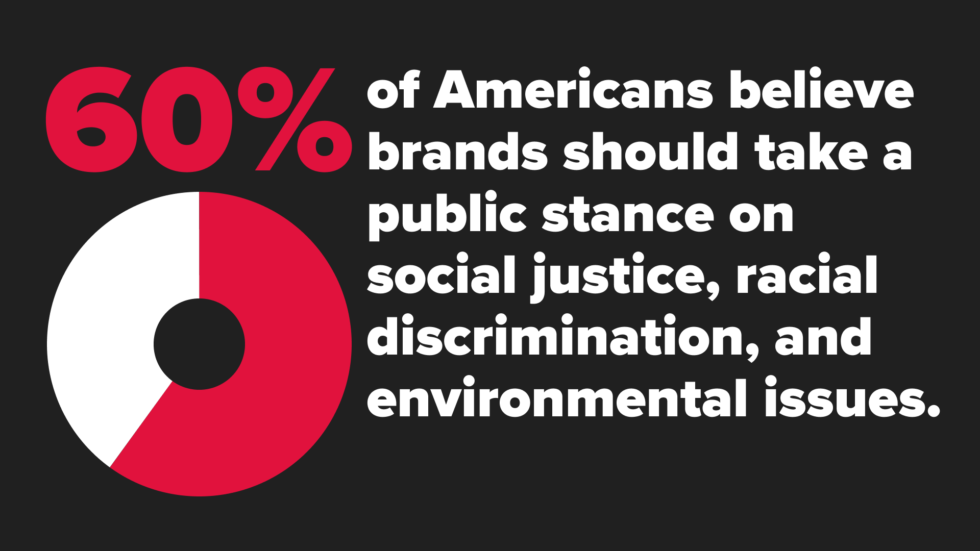
From Nike partnering with civil rights icon Colin Kaepernick to Victoria’s Secret’s recent pro-women rebrand, companies are no longer staying silent on issues that matter. And with good reason: Consumers are more socially conscious than ever before.
Nearly 60% of Americans believe brands should take a public stance on social justice, racial discrimination, and environmental issues. Consumers today also have higher expectations when it comes to ethical sourcing and product transparency. This is especially true for younger shoppers, namely Gen Z. 97% of Gen Zers say online platforms are their top source of shopping inspiration, but they’re also highly critical of marketing content and, as a whole, expect more authenticity from brands.
After all, Gen Z is the most socially responsible generation to date. 56% consider themselves socially conscious consumers, and 51% say they make sure a brand’s corporate social responsibility aligns with their own before buying its products. Shoppers care about who you work with and what you stand for—more than you think.
To cultivate a more meaningful connection with their audience, brands need to support causes that they genuinely care about. And marketing campaigns often play a key role in this process by helping brands convey their company values to consumers. From establishing a diverse and inclusive influencer marketing program and partnering with sustainability creators, to launching timely activations with nonprofits, a purpose-driven social media campaign can have a lasting effect on your brand image.
To generate real engagement among younger audiences, consider investing in creator partners that truly embody your company values.
It’s all about representation
Most consumers want brands to be more outspoken about social issues—but did you know that expectation can be even higher depending on consumer demographics? Compared to just 60% of the general population, 69% of Latinx Americans, 71% of LGBTQ+ Americans, and 82% of Black Americans expect companies to take a stand.
Consumers belonging to traditionally marginalized groups want to see their own values and experiences reflected in their favorite brands. As they establish partnerships with creators, brands should collaborate with diverse individuals to connect organically with their audiences.
TV streaming service Philo, for example, goes the extra mile to ensure inclusivity in its creator relationships. After identifying its primary audience on social media as Black moms, families, and LGBTQ+ individuals, Philo knew that it needed to revamp its creator marketing program to make a real impact in upcoming campaigns.
By partnering with prominent Black actors like Rick Fox and Holly Peete to advertise their own shows on Philo’s platform, and working with popular drag queen creators to promote RuPaul’s Drag Race, the TV streaming service built a more meaningful connection with viewers.
As you prioritize diversity and representation in your creator marketing program, make sure these values are deeply ingrained in other aspects of the business too. Remember: Gen Zers are especially sensitive to brand authenticity. Creator partners aren’t just boxes on a checklist—they should be a direct reflection of your brand as a whole.
Real purpose drives real engagement
A values-based brand identity is crucial to achieving consumer trust: 79% of Americans say they are more loyal to purpose-driven companies, and 75% say they would try an entirely new product line from a company they already support.
Selling a product or service will always be a top priority for brands. But in order to attain a certain level of credibility, brands must seize opportunities to connect with their customers. An authentic brand narrative is built on actions, not just words—and to demonstrate a strong commitment to a cause, companies need to do their own research and establish unique creator partnerships that reflect their mission.
When accounting software company QuickBooks looked to TikTok to promote its new partnership with the UN Climate Change Conference last year, Jessica Clifton (known as @impactforgood_) emerged as an obvious first choice. A passionate advocate for environmental awareness, Jessica almost exclusively posts videos around eco-friendly lifestyle habits, DIY sustainability hacks, as well as her experience as part of the zero waste movement. An already-established voice in TikTok’s sustainability community, Jessica was able to elevate the impact of QuickBooks’ initiative with more than 3.9M views.
What made Jessica’s partnership with QuickBooks so successful was the way in which she aligned herself with the brand. Using clear examples, she explains the urgency of climate change and how it personally motivated her to start a TikTok account—and at the end, she mentions QuickBooks while advertising the Climate Change Conference, calling on businesses to take action. By integrating her own story into the brand’s mission, Jessica was able to add a personal touch to the campaign.
Again, selecting the right creator partners is key to driving an authentic purpose-driven marketing strategy. While tapping creators to shed light on sustainability initiatives is crucial to elevating both the brand and the cause, marketers should always be mindful of concerns around greenwashing—a deceptive advertising spin that prioritizes brand image over actually making a difference in the company’s environmental footprint.
By connecting with consumers on issues that matter, purpose-driven brands can build a genuine relationship with their customer base and, in effect, instill a stronger sense of brand loyalty. More than ever, social media campaigns play an increasingly vital role in earning authentic love for brands—and working with creator partners that embody your company values is the first step forward in realizing that goal.


